Farming Organically
written by Dianne Carofino photos: George Carofino
What makes a farm “organic,” one that grows organic produce? We put that question to Alex Kronick as we tour Caoba Farms, his five-acre organic farm on the outskirts of La Antigua Guatemala. Alex began his business six years ago, originally selling organic produce to one restaurant, and then quickly adding a second. He now sells to 100 hotels and restaurants and over 50 private homes in Guatemala and El Salvador.
As we walk through his farm with Alex, we are surprised by the amount of produce that can be grown within this contained space and delighted by the variety we encounter. There are long, neat rows of lettuce, asparagus beds, and banana trees. There are blueberry and strawberry bushes with sweet fruit that Alex picks and offers to us. There are not quite enough berries to sell commercially yet; perhaps soon. There are hens and turkeys laying eggs. Not yet enough eggs to sell, but, again, possibly soon.
Products that are available year round include several varieties of lettuce, such as arugula; spinach; leeks; chives; sprouts; and fresh herbs such as rosemary, basil and cilantro. Throughout the year, other produce becomes available with its growing season. Produce ranges from the familiar, such as limes and eggplant, to items like malanga, unfamiliar to many shoppers. Malanga is a root vegetable, similar to potato, but full of protein and containing no gluten. It is prepared in any way that a potato would be prepared.
Produce is cut either early in the day, at 6 a.m., then washed and packaged for delivery that day, or cut late in the day, between 3 and 8 p.m., refrigerated overnight and delivered the next day. While all produce is washed, some items are washed three times and disinfected. These distinctions are clearly marked on the Caoba Farms packaging.
Frequency of orders may range from daily, in the case of larger establishments, to every two weeks, for smaller restaurants and hotels and some private homes.
Back to our original question: what does make Alex’s produce “organic?”
He explains that there are a number of factors that contribute to this designation:
- Seeds have not been genetically altered and are of high quality. Some of the seeds are produced at Caoba Farms; others are purchased from the United States and are certified as organic by the United States’ Department of Agriculture (USDA).
- Plants are grown in natural sunlight, as opposed to artificial sunlight.
- Fertilizers are natural. Decomposed mulch from the Guatemalan mountains, as well as Caoba’s own compost and organic fertilizer are used. (Caoba’s organic fertilizer may also be purchased.) Earthworm casts (consisting of waste excreted after feeding) aerate the soil.
- The soil is turned frequently. This prevents many types of fungus. An organic fungicide, also certified by the USDA, and actually a “good” fungus that feeds on “bad” fungus, is utilized.
What about insecticides?
The general public is perhaps most concerned with the use of these products when looking for organic produce. Alex uses natural pest repellants, such as garlic and neem oil. Neem oil comes from trees grown in India and Africa and kills the larvae of mosquitoes. Other products containing these ingredients, and certified as organic by the USDA, are also used.
Alex emphasizes that when plants are healthy, they are better able to withstand pests without a great deal of support from repellant products. His emphasis on maintaining healthy plants reduces his need to utilize even these natural products.
Alex was born and raised in Antigua. His mother has always enjoyed gardening, particularly with flowers, and Alex, while on school vacation, began to add salad to the garden beds. During high school and college in the United States, he was introduced to organic food and found that he enjoyed eating organically. As he sought out organic products in farmers’ markets, he realized that he could also garden organically, and began experimenting with this type of gardening.
Alex has a bachelor of science degree in entrepreneurship from the Sierra Nevada College in Lake Tahoe, U.S. He cites consistency—in product, price and policy—as the number one piece of advice he would give to a potential entrepreneur.
Caoba Farms prides itself on the consistency of the quality of the produce, as well as consistency in policies, such as quick delivery after cutting.
What about prices?
Alex characterizes Caoba Farms’ prices as “more expensive than the mercado; less expensive than the large grocery stores.”
He began Caoba Farms when he returned to Antigua after his college graduation, with the support of his father. The name, Caoba, is the Spanish word for mahogany.
With such a large variety of quality produce available at all times, a big question poses itself: What does Alex like to cook?
He mentions barbecued eggplant. “Spread barbecue sauce on slices of eggplant and grill.” Another favorite is “stir-fry, with baby bok choy, spring onions and leaks. Add pasta and shrimp, chicken or crispy fish.”
To order produce from Caoba Farms, tels: (502) 5119-0278 or (502) 4507-8341, call a day ahead of anticipated delivery, before 5 p.m. Delivery to Guatemala City is on Monday, Wednesday and Friday.
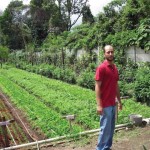
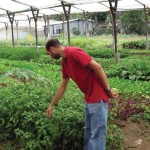
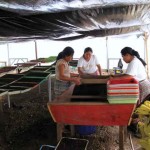
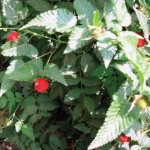
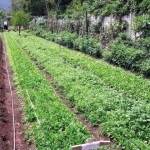
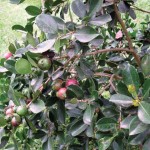
We will stay at Antigua for one and half month and would like to order the organic products from Caoba Farm. Is it possible to pay a visit of the farm?
alex your stuff is great!!! we love it… keep on going like that